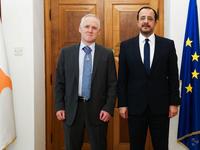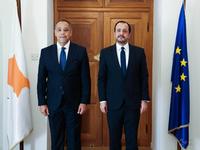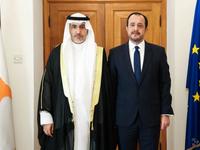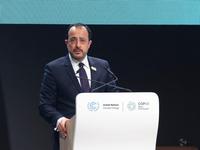Press Releases
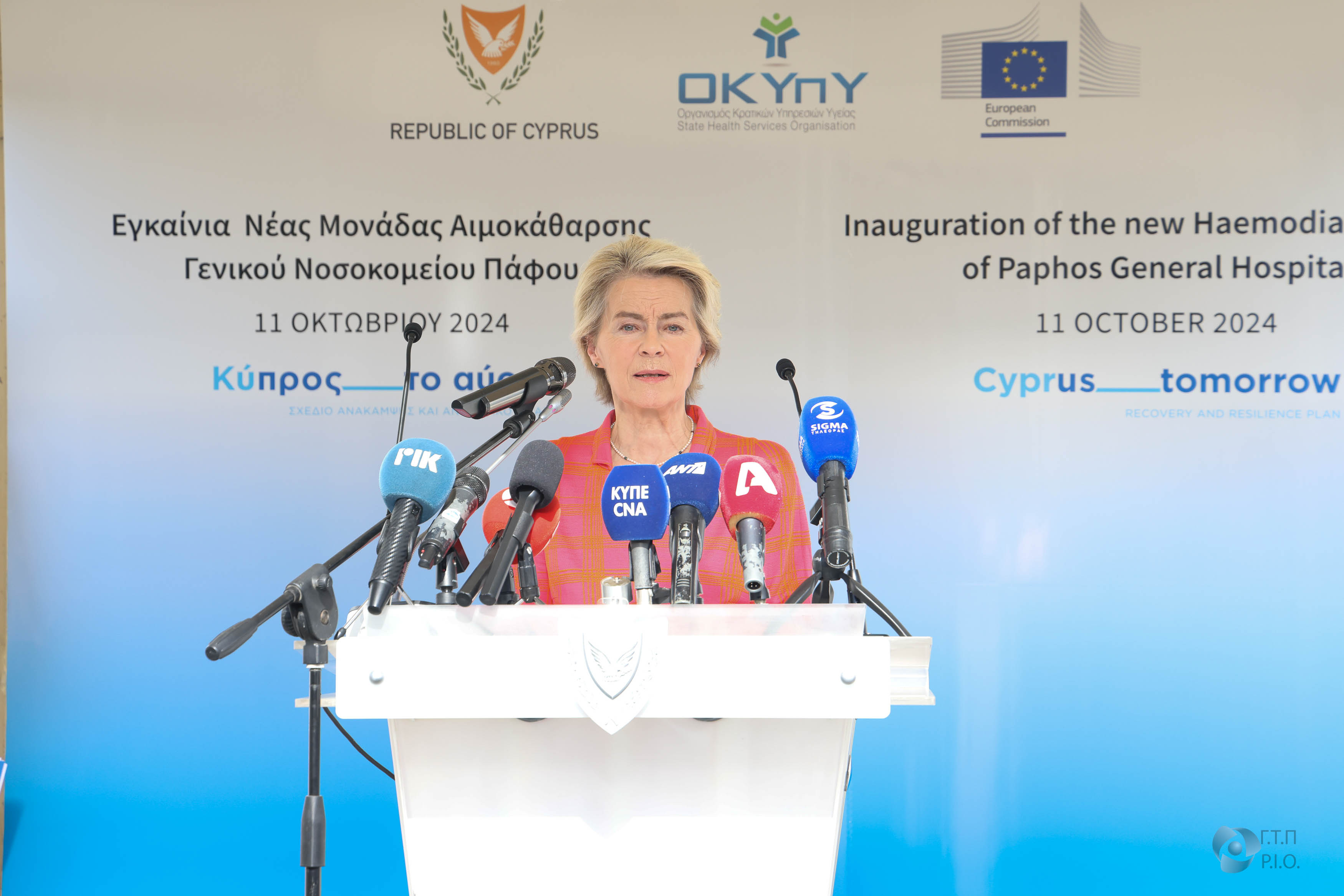
11-10-2024 14:04
Speech of the President of the European Commission, Ms Ursula von der Leyen, at the inauguration of the Haemodialysis Unit of Pafos General Hospital
Thank you very much, Mr President, dear Nikos, and I'm glad to see the former president of the Republic of Cyprus too. Thank you, dear Nikos, for this moving visit at the Pafos Hospital. And thank you to all those who are working in this hospital for your outstanding service, day and night, for the patients. We have just inaugurated the new dialysis unit, and it means closer and easier access to care. It makes a big difference for patients. Especially for these dialysis patients, who go through treatment several times a week, as we have heard, twice a week or three times a week, you can imagine what a difference it makes if you save time because care is closer to you. And this is a precious lifetime, a gift of lifetime, a gift of a full and healthier life. I am glad that you are with next generation you can contribute to it.
Indeed, Next Generation EU is Europe's massive funding program. It supports reforms and investments like never before all across Europe, so here too in Pafos. We have invested close to €4 million in this new care unit. It is a concrete example of what Next Generation EU can achieve in Cyprus and, with your €1 billion from Next Generation EU, there are much more success stories to be written, or they are being written right now. The Commission continues to stand with you to make these plans a success.
Indeed, this afternoon we will have our annual MED9 Summit and our discussions there will help prepare upcoming meetings. On the one hand, the European Council and on the other hand, the first ever EU Gulf Cooperation Council Summit. It is important that the unique experience and the viewpoints of the Mediterranean Member States are reflected in those meetings.
So firstly, this afternoon we will discuss the Middle East. This is particularly important in this situation. Iran's recent massive ballistic missile attack against Israel constitutes a serious escalation and threat to regional stability. I would like to reintegrate our call for a cessation of hostilities as soon as possible, to create space for a diplomatic solution along the blue line. And this must be consistent with the United Nations Security Council Resolution 1701. I would like to thank Cyprus for its operational readiness to aid possible evacuation operations from Lebanon and Mr President as you have described for months, your successful work to deliver humanitarian aid to Gaza.
Secondly, indeed, we will meet with the King of Jordan. For us, Jordan is a strategic partner. In this crisis, Jordan plays a pivotal role in the stability of a volatile and complex MENA region, but also beyond this crisis, Jordan is an important friend and, as I said, a strategic partner to the European Union. So, we will take the opportunity to discuss our bilateral partnership. I met King Abdullah two weeks ago at the UN General Assembly in New York, and I assured him of the European Union's long-term support to prosperity and reforms in Jordan.
Thirdly, we will discuss European priorities for the next five years. We have a broad agenda, as you can imagine. Our first priority is competitiveness. We don't only want Europe to catch up, but we want Europe to lead globally. And for this we have, of course, homework to do, whether it's cutting red tape so that our SMEs and our industries can work better or whether it's bringing down energy prices. We have been successful in lowering energy prices, but they're still structurally too high.
Whether it's training and education for people for the new tasks or, for example, the mobilisation for innovation. The list is long but very important. And of course, we want to talk about another priority, which is migration. Migration is a European challenge and it requires European solutions. Our joint efforts on migration are starting to pay off. If you look at the figures of irregular arrivals in the first eight months of this year, the central Mediterranean route, historically one of the most busy, saw a decrease of 64%. We also saw a 75% drop on the Balkans route. But migratory routes are constantly evolving. We see now a surge of arrivals to Greece and the Spanish Canary Islands. This requires constant effort and constant attention. Our migration and asylum pact is our common road map for that. We must now focus on making the pact a reality on the ground and the Commission is ready to provide the necessary support for this to our Member States.
In parallel, we will continue our operational work. In other words, we will keep supporting our Member States in reinforcing border surveillance, fighting smuggling and trafficking, and working on returns. I know that Cyprus has made good progress in managing their asylum procedures and returns, and we will continue building strategic relations with third countries of origin and transit, with a key focus on the Mediterranean. Dear Nikos, we have seen with Lebanon how important it is to engage with the partner countries and that this type of engagement definitely brings results.
Dear Nikos, the Mediterranean has long served as a key gateway to three continents. Today it is the vital artery for global trade, for energy flows, but it is also a frontline of geopolitical influence and tragically, a backdrop for far too many humanitarian crises and migration tragedies. And this is the reason why I have defined a specific Mediterranean portfolio in my new Commission. This has never been the case before. It's the first time, and I asked Commissioner-designate Dubravka Šuica to develop a pact for the Mediterranean so that we specifically look at those topics. I want to make sure that it reflects your real reality and your interests. Your reality is also that of a beautiful –I witnessed it myself all these days here– but also vulnerable island, because the Mediterranean region is particularly affected by rising temperatures –you know it better than anybody else– and extreme weather phenomena. In Cyprus we already see an increase in heat waves and droughts. We are here to support you. We did so, for example, by spending two firefighting planes this summer right here in Pafos.
We will also invest together with you and your carbon neutral future. We want to kick start the clean energy transition in Cyprus. And we want to help protect your ecosystems because both are crucial to people's livelihoods.
One last word, dear Nikos, on the trilateral meeting that you will have next week in New York with the Secretary-General of the United Nations, António Guterres. We welcome this positive development and the European Union remains fully behind your efforts to resume peace talks for a comprehensive settlement of the Cyprus issue. This should take place within the UN framework on the basis of a bi-communal bi-zonal federation with political equality, and it should be in accordance with all relevant Security Council resolutions as well as in line with the principles on which the EU was founded and the EU acquis.We also stand ready to support all stages of the UN led process with an appropriate means.
Ladies and gentlemen,
We have a huge agenda together with the Mediterranean. This is good work together. This is lots of opportunities which we want to grasp. This is a lot of positive projects and development we have to work on. I want to thank you again that you invited me to this beautiful island, and I'm very much looking forward for more cooperation. Thank you so much.
(NGian/AP)
Relevant Press Releases
